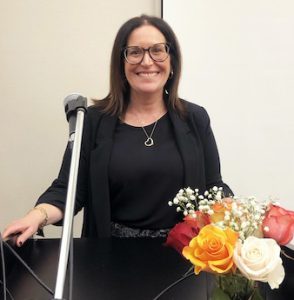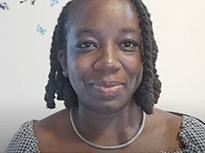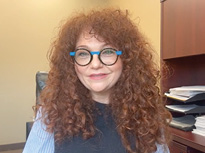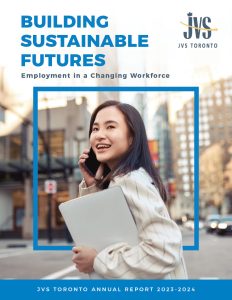

We would like to extend our heartfelt thanks to everyone who attended JVS Toronto’s 77th Annual General Meeting held on September 25th. It was truly great to come together and celebrate the achievements we’ve made over the past year.
The AGM began with a formal business portion, and our CEO, Allison Steinberg, highlighted the incredible resilience and dedication of our staff, volunteers, donors, and community partners in supporting over 16,000 clients and over 6,800 employers this past year. It’s been a challenging time for many, and our collective efforts have continued to make a real impact in the lives of those we serve.
Congratulations to this year’s award recipients!
One of the most meaningful parts of the evening was the awards ceremony, where we recognized the remarkable accomplishments of our clients, volunteers, and employers. Congratulations to all our award recipients.

Julene Powell, Recipient of the Joseph Skolnik Award for New Canadians. Accepted the award via video.

Siddharth Joshi, Recipient of the Betty Skolnik Award for Emerging Professionals. Pictured with Bill Skolnik.

Perrier Walters, Recipient of the Freedman Family Award for Young Entrepreneurs. Pictured with Nancy Freedman.

Marc McNamara, Recipient of the Kim Coulter Career Counselling Award. Pictured with Jonathan Kopman.

Pelmen Foods, Recipient of the Eunice & David Mouckley Employer Award. Accepted the award via video.

Give and Go, Recipient of the Eunice & David Mouckley Employer Award. Pictured with Jeff Mouckley.

George Hu, Recipient of the Berger Family Inspirational Award. Pictured with Esther Chudy.

Sandeep Dani, Recipient of the Manny Mitchell Award for Excellence in Volunteerism. Accepted the award via video.
These stories remind us of the power of perseverance and community, and we are incredibly proud to share in their success. Once again, thank you to all who made the evening possible, and to our staff, volunteers, and supporters – your contributions make our mission possible.
JVS Toronto’s 2023-2024 Annual Report
In this report, you’ll find inspiring stories like Perrier’s – a young entrepreneur from our Youth Entrepreneurship Program who came back to JVS Toronto to turn his passion into a successful barbershop. You’ll meet Mina, a newcomer and single mom who found a job in the competitive IT field, and Frank, a single father in his 60s who found joy working in a synagogue kitchen and giving back to his community. These stories show the heart of what we do – helping people find not just jobs, but build sustainable careers with resilience and hope.
Read More In Our Annual Report





